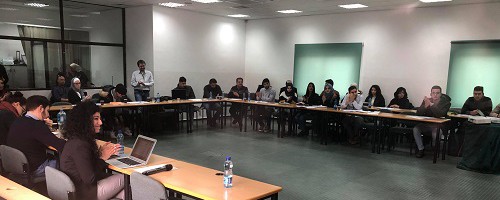“Statehood Ramifications on Palestine and the Palestinians: Legal, Economic and Political Implications”
Birzeit, 5th of March 2019: Joint efforts between Birzeit University - through both its Department of Law and Public Administration and the Institute of Law - with Aristotle University through its Faculty of Economics and Political Science, provided a successfully held workshop on the 4th of March, 2019 titled: “Statehood Ramifications on Palestine and the Palestinians: Legal, Economic and Political Implications”
The workshop aimed to shed light on the ramifications consequent to the Palestinian Statehood project from different viewpoints considering the social, economical and political aspects in relation to it, both local and international academics and law professionals took part in presenting their papers, including Greek, Italian, Spanish and British speakers.
Opening remarks were made by Dr. Asem Khalil, Vice President for Community Affairs and Acting Director of the Institute of Law, along with Dr. Hala Shoaibi, Chairperson of the Department of Law at Birzeit University, and Dr. Grigoris Zarotadis, Dean of the Faculty of Economics and Political Science in Aristotle University.
The workshop was conducted through an entire day event, four sessions were held. The first session titled “Building a Palestinian State” included the topics of citizenship, the residing challenges of human rights in Palestine along the statehood project. The second session titled “Colonialism, Resistance, and Palestinian Statehood” discussed mechanics of settler colonialism, and understanding of the Palestinian economy and challenges, along with legal battles and resilience strategies. The third session titled “Human Rights and Palestine”, included discussing human rights violations by the Israeli occupation authorities against Palestinians, including violations of the rights of political prisoners such as force-feeding and forced displacement of Palestinians. Lastly, the fourth session titled “Problematizing Palestinian Statehood” introduced the problematic aspects of the statehood project in connection to foreign aid providers and donor’s policies, as well as a deeper view on Palestinian statehood, with a critical approach to modernity and national unity. As for the closing and concluding ceremony, Dr. Reem Botmeh provided a quick review of what has been discussed through both the papers and the discussion panel, highlighting the main issues and topics.






